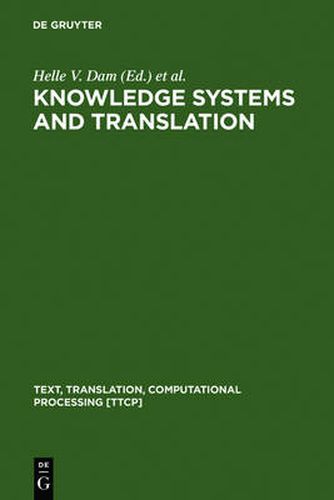Readings Newsletter
Become a Readings Member to make your shopping experience even easier.
Sign in or sign up for free!
You’re not far away from qualifying for FREE standard shipping within Australia
You’ve qualified for FREE standard shipping within Australia
The cart is loading…






This title is printed to order. This book may have been self-published. If so, we cannot guarantee the quality of the content. In the main most books will have gone through the editing process however some may not. We therefore suggest that you be aware of this before ordering this book. If in doubt check either the author or publisher’s details as we are unable to accept any returns unless they are faulty. Please contact us if you have any questions.
It is generally agreed that knowledge plays an important role in translation and interpreting and that it should therefore be of central concern to translation and interpreting studies. However, there is no general agreement about what is actually meant by the term ‘knowledge’ in this context, nor about in exactly what ways it is relevant. Also, present-day translation and interpreting studies offer only a limited amount of research specifically dedicated to knowledge systematization and other knowledge-related issues.
This book is one of the first to systematically and exclusively address the question of knowledge in translation and interpreting. It is a collection of papers by leading scholars both from the field of translation and interpreting and from adjacent fields where knowledge also plays an important role, such as linguistics and computer science. The experts present a wide variety of conceptions of knowledge and a number of different approaches to the study of knowledge in translation and interpreting: some of them draw on concepts such as scenes and frames, mental spaces and semantic networks, some discuss knowledge systems from an ontological point of view, and some present more general concepts of knowledge in translation and interpreting. Along the same lines, some of the contributors deal mainly with theoretical and conceptual aspects, others focus on methodological issues, and again others report on empirical studies. What brings them together, however, is their common focus on the interface between knowledge and translation/interpreting, and their main achievement is that, by joining forces, they manage to present to their readers a state-of-the-art report which offers both a clearer delimitation of the concept of knowledge and a better understanding of its role in translation and interpreting.
$9.00 standard shipping within Australia
FREE standard shipping within Australia for orders over $100.00
Express & International shipping calculated at checkout
This title is printed to order. This book may have been self-published. If so, we cannot guarantee the quality of the content. In the main most books will have gone through the editing process however some may not. We therefore suggest that you be aware of this before ordering this book. If in doubt check either the author or publisher’s details as we are unable to accept any returns unless they are faulty. Please contact us if you have any questions.
It is generally agreed that knowledge plays an important role in translation and interpreting and that it should therefore be of central concern to translation and interpreting studies. However, there is no general agreement about what is actually meant by the term ‘knowledge’ in this context, nor about in exactly what ways it is relevant. Also, present-day translation and interpreting studies offer only a limited amount of research specifically dedicated to knowledge systematization and other knowledge-related issues.
This book is one of the first to systematically and exclusively address the question of knowledge in translation and interpreting. It is a collection of papers by leading scholars both from the field of translation and interpreting and from adjacent fields where knowledge also plays an important role, such as linguistics and computer science. The experts present a wide variety of conceptions of knowledge and a number of different approaches to the study of knowledge in translation and interpreting: some of them draw on concepts such as scenes and frames, mental spaces and semantic networks, some discuss knowledge systems from an ontological point of view, and some present more general concepts of knowledge in translation and interpreting. Along the same lines, some of the contributors deal mainly with theoretical and conceptual aspects, others focus on methodological issues, and again others report on empirical studies. What brings them together, however, is their common focus on the interface between knowledge and translation/interpreting, and their main achievement is that, by joining forces, they manage to present to their readers a state-of-the-art report which offers both a clearer delimitation of the concept of knowledge and a better understanding of its role in translation and interpreting.